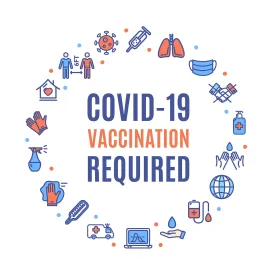On November 4, the U.S. Department of Labor (DOL) released the anticipated, but controversial, emergency standard implementing President Biden’s directive that all employers of 100 workers or more must require their employees to be fully vaccinated against COVID-19 or mask up and get tested for the virus each week.
The new rule, an “Emergency Temporary Standard” (ETS), was released by the DOL’s Occupational Safety and Health Administration (OSHA). Legal challenges to the ETS are anticipated, and such challenges may cause implementation of the ETS to be delayed or ultimately rejected. Key points from the new ETS are below:
Compliance
-
Deadlines for Compliance. The ETS is effective November 5, 2021 with the following compliance requirements:
-
Effective December 5, 2021: Unvaccinated employees must wear a face mask while in the workplace. Covered employers must provide paid time for employees to get vaccinated.
-
Effective January 4, 2022: Covered employers must require employees to either be fully vaccinated or produce a verified negative test on at least a weekly basis.
-
-
Covered Employers. The ETS covers all employers with 100 or more employees. Part-time employees and remote workers are included in the number of employees for the purpose of determining coverage, but employees of staffing agencies need not be included. Only employees at U.S. locations are counted. Two or more related entities may be regarded as one employer – and thus their employees must be counted together – if they handle safety matters as one company.
-
Time Off for Vaccination. Covered employers must support vaccination by providing reasonable time, including up to four hours of paid time, to receive each vaccination dose. Employers must provide reasonable time off and paid sick leave to recover from side effects following each dose.
-
Masking. All covered employers must ensure that unvaccinated employees wear a face mask while in the workplace.
-
Vaccination or Weekly Testing. All covered employers must implement and enforce a policy that mandates their employees receive the necessary shots to be fully vaccinated – either two doses of Pfizer or Moderna, or one dose of Johnson & Johnson – unless the employer instead implements and enforces a policy mandating any unvaccinated employee to produce a negative test weekly and wear a mask while in the workplace. All covered employers must ensure that any employee still unvaccinated after January 4, 2022 begins producing a verified negative test to their employer on at least a weekly basis. COVID-19 tests that are both self-administered and self-read do not satisfy this requirement.
-
Acceptable Proof of Vaccination Status. Employers must determine the vaccination status of each employee. Acceptable proof of vaccination status is a record of immunization from a health care provider or pharmacy, a copy of the COVID-19 Vaccination Record Card, a copy of medical records documenting the vaccination, or another copy of immunization records from a public health system. A signed and dated employee attestation is acceptable in instances when an employee is unable to produce proof of vaccination. These records must be preserved while the ETS is in effect and are subject to audit by OSHA.
Exemptions
-
Remote Workers. Employees who telework or do not report to a workplace where other people work are exempt from compliance with the vaccination and testing requirements. However, they still must be counted for purposes of determining whether the 100-employee threshold has been met.
-
Outdoor Workers. Employees who work “exclusively outdoors” are exempt from the ETS vaccination and testing requirements. An employee works exclusively outdoors if he or she works outdoors for the duration of every workday except for de minimis use of indoor spaces where others are present.
-
Part-time Workers. The ETS applies to part-time workers as well as full time workers, although the weekly testing requirements are adjusted if an unvaccinated part-time employee does not enter the office every week. If away from the workplace for a week or longer, the employee must produce a verified negative test within seven days before returning to the workplace.
-
Medical or Religious Exemptions. The employer vaccination policy required by the ETS should provide for those legally entitled to reasonable accommodation for disability or religious reasons. Such exempt employees must participate in the weekly COVID-19 testing requirement and wear face coverings.
Employees who have previously contracted COVID-19 are not exempt from the vaccination, testing, or masking requirements.
It remains to be seen whether MIOSHA, Michigan’s own worker safety agency, will modify the ETS and trigger additional requirements for Michigan employers.
Co-authored by Justin M. Wolber







 />i
/>i

